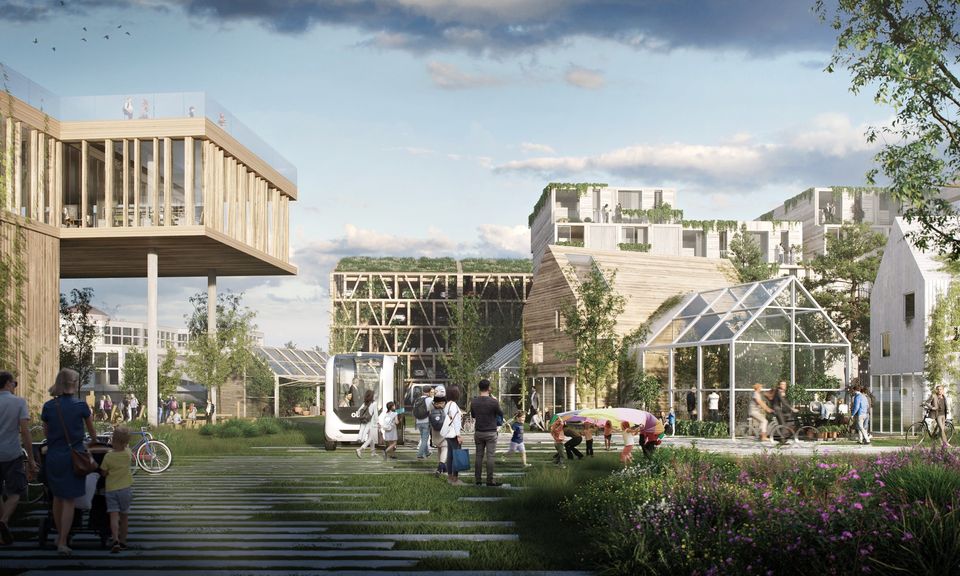HYBES project Unveils Living Lab Model for Decarbonisation in Rural Regions
The HYBES project, which focuses on hybrid energy solutions for buildings and infrastructure, has introduced a Living Lab Model (HLLM) designed to advance decarbonisation and energy efficiency in rural and peripheral areas.

This initiative aims to create Decarbonisation Zones by leveraging local knowledge, fostering citizen engagement, and forming multi-stakeholder partnerships.
What is the HYBES Living Lab Model (HLLM)?
The core principles of the HYBES Living Lab model include a place-based approach, which emphasises tailoring solutions to specific local contexts, including community-driven measures of change and making decarbonisation a collective effort. The initiative involves public, private, academic, and civil society stakeholders. The model adopts a challenge-based approach to drive innovation by leveraging community assets and sharing knowledge and insights across regions.
Stakeholder Workshops Propel Decarbonisation Efforts
In the last eight months, partners from Akureyri, Bodø, Cork, Tórshavn, and Umeå have worked extensively to map out stakeholders and lay the groundwork. They have held local workshops to understand current decarbonisation efforts and regional arrangements, which are crucial for tailoring the HLLM to fit specific regional contexts and needs.
Each region chose specific geographic focal points to align their decarbonisation efforts with local strategic opportunities, ensuring that initiatives were relevant and impactful within each area's unique context.
Akureyri focused on leveraging local geothermal resources to drive decarbonisation. Bodø highlighted the need for enhanced capacity building among stakeholders to ensure the effective implementation of decarbonisation strategies. Tórshavn discussed the importance of community engagement in promoting renewable energy adoption. Umeå stressed the potential for mutual learning and knowledge transfer to accelerate regional decarbonisation efforts.
Cork focused on integrating decarbonisation efforts with existing local projects, including the ambition to develop Macroom as a designated Decarbonisation Zone. As part of this initiative, the Cork County Council, in partnership with UCC, started mapping the region's strengths, networks, and best practices, aiming to position Macroom as a leader in sustainable energy transitions. Over the next year, stakeholders will be engaged through a sustained co-creation process, with a major event planned for 2025 to bring together community, business, education, and public sector leaders to envision Macroom's decarbonised future.
The workshops and initial activities set the stage for understanding existing engagement practices and finding ways to enhance community involvement. A framework for interregional knowledge sharing and mutual learning was developed to promote the exchange of best practices and innovations across different regions and enhance the project's overall impact. The report detailed efforts to engage academia, industry, government, and civil society stakeholders, which is crucial for driving locally led change and ensuring a holistic approach to decarbonisation.
Policy Recommendations in the HYBES Report
The HYBES report outlines several policy recommendations aimed at enhancing the effectiveness and scalability of Living Labs for decarbonisation. These recommendations are designed to support the development of sustainable, community-driven innovations that can be adapted across different regions. Here are the key policy recommendations:
- Strategic Funding Allocation:
- Governments and international bodies should allocate dedicated funding to support the establishment and operation of Living Labs. This funding should cover both initial setup costs and ongoing operational expenses.
- Funding mechanisms should be designed to encourage long-term sustainability and scalability of Living Labs, ensuring they can continue to operate and expand their impact over time.
- Integration into Policy Frameworks:
- Living Labs should be integrated into broader environmental and economic policy frameworks. This integration ensures that the objectives of Living Labs align with national and international decarbonisation goals.
- Policies should be developed to support the coordination between Living Labs and existing local, regional, and national initiatives, fostering synergy and avoiding duplication of efforts.
- Support for Quadruple Helix Partnerships:
- Policies should encourage the formation of partnerships between academia, industry, government, and civil society. These partnerships are crucial for leveraging the strengths and resources of different sectors to drive innovation and implementation of decarbonisation strategies.
- Incentives should be provided to promote collaboration among these stakeholders, facilitating knowledge, resources, and best practices sharing.
- Capacity Building and Training:
- Policies should support capacity-building initiatives that equip communities with the skills and knowledge necessary to participate in and sustain Living Lab activities. This includes training programs on energy efficiency, renewable energy technologies, and community engagement practices.
- Educational institutions and vocational training centres should be involved in delivering these capacity-building programs to ensure broad accessibility and impact.
- Fostering Mutual Learning and Knowledge Sharing:
- Policies should promote the establishment of frameworks for mutual learning and knowledge sharing between different regions and Living Labs. This can be achieved through regular inter-regional workshops, conferences, and collaborative projects.
- Digital platforms and networks should be developed to facilitate the exchange of information and best practices, making it easier for Living Labs to learn from each other and adapt successful strategies to their local contexts.
- Monitoring and Evaluation:
- Policies should include provisions for continuously monitoring and evaluating Living Lab activities to assess their impact on decarbonisation efforts. This involves setting clear metrics and indicators to measure progress and outcomes.
- Regular reporting and feedback mechanisms should be established to ensure transparency and accountability, allowing for the iterative improvement of Living Lab models and strategies.
- Community Empowerment and Engagement:
- Policies should prioritise community empowerment and engagement, ensuring that local populations are actively involved in the decision-making processes related to decarbonisation initiatives.
- Support should be provided for grassroots movements and local organisations that advocate for and implement sustainable practices within their communities.
The initial phase of the HYBES project successfully established a solid foundation for advancing decarbonisation through collaborative, place-based approaches. The ongoing reflective practice and iterative development of the HLLM promises to yield valuable insights and impactful interventions in the coming phases.
The full report is available here for a comprehensive understanding and detailed insights.


